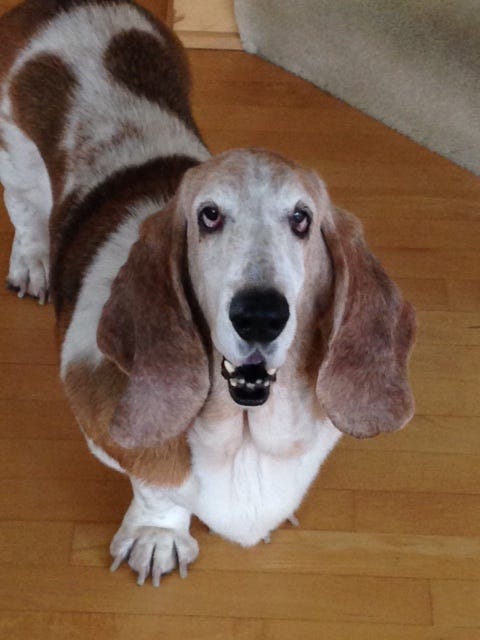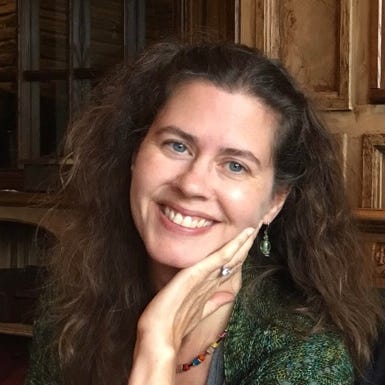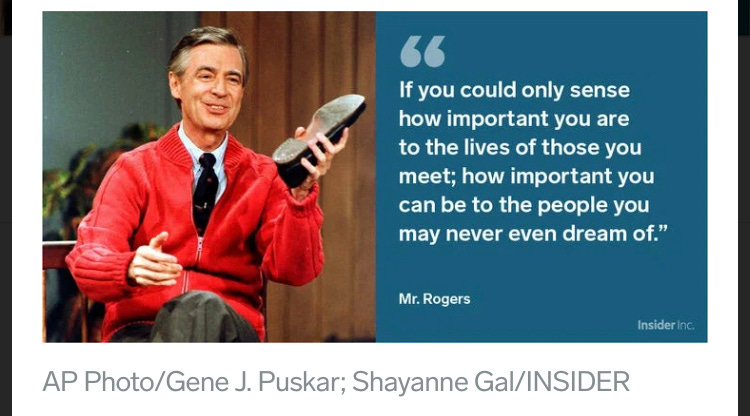Let's Make March 20 National Mr. Rogers Day
"Neighbor is not a geographical term. It is a moral concept."
Who doesn’t love Mr. Rogers? Whether we admire him for his kindness; for his honesty about difficult feelings and subjects; for his courage in speaking up for what is right; for his openness and warmth toward people of all shapes, sizes, ages, and colors; or—if you’re high-school-aged me1—for his mad skills at jazz piano, we can all agree that he is the hero and role model we need right now. March 20 is Mr. Rogers’s birthday. I think we should make March 20 National Mr. Rogers Day—a day when we try to emulate Mr. Rogers in our interactions with everyone we meet. We already have National Talk Like a Pirate Day (September 19), National Sneak Some Zucchini onto Your Neighbor’s Porch Day (August 8), and National Puppy Day (isn’t that every day?), so surely we ought to have National Mr. Rogers Day too, right?
This year, I’d like to observe National Mr. Rogers Day by focusing on an idea that was important to him: Being a good neighbor. As the quote in my subtitle puts it (the quote is from a speech given by Rabbi Joachim Prinz at the March on Washington in 1963), “Neighbor is not a geographical term. It is a moral concept.” The opening song to Mr. Rogers’ Neighborhood makes this point clear: Mr. Rogers invites all of us to be his neighbors. Did you listen to the song, and were you humming along? I wasn’t exaggerating when I said that Mr. Rogers was a talented jazz musician. The words of the song are simple and repetitive so that children can learn it, but the song features jazz riffs and chords so that the adults who are watching with their kids (or the teenagers who are watching to relax after a stressful day in high school) will enjoy the music too. Mr. Rogers is for everybody.
Mr. Rogers welcomed even people he had never met to be his neighbors. I know this is true because of a story from my husband’s childhood. When my husband, Matt, was a little boy, his father, who was a child psychiatrist, attended a conference where Mr. Rogers was one of the speakers. He asked Matt if he had any message or question for Mr. Rogers, promising that if he met Mr. Rogers, he would pass it along. Matt said he did have a question, but he didn’t want to share it with his dad—he wanted to say it directly to Mr. Rogers. That night, there was a phone call for Matt. It was Mr. Rogers! He said, “I hear that you have a question for me?” Matt asked him if he was really Mr. Rogers, or if he was just playing Mr. Rogers on TV.2 Mr. Rogers assured Matt that he really was Mr. Rogers all the time. Did we ever doubt it?
To me, neighborliness is the most beautiful aspect of Mr. Rogers’s philosophy. The problems of the world can seem overwhelming at times, and we often feel helpless to do anything about them. But we all have neighbors, we all know people who might need a little help, and we all are capable of being kind to people right here in our backyard, however we define our backyard. As a short story by Leo Tolstoy, adapted by children’s author Jon J Muth, concludes,
Remember then that there is only one important time, and that time is now. The most important one is always the one you are with. And the most important thing is to do good for the one who is standing at your side. . . . That is why we are here.
We can’t fix the whole world, but we can make the world a little bit better right where we are. One of the many lessons Mr. Rogers teaches is that our neighbors offer us the opportunity to give and receive kindness every day.
“Anyone who does anything to help a child in his life is a hero to me”
A comedian I like, Mike Birbiglia, often starts his interviews with an ice-breaker: Who was an interesting neighbor from your childhood? The question works because we all have neighbors who were important to us when we were growing up. For me, it’s not one person but a whole family, of three generations, who lived next door to us. The Jacobs3 family had an enormous cottonwood tree that was perfect for a fort, a huge back deck to hide under, and an open door so we could run in and out without needing to knock, to grab a glass of water or a snack. Grandma Jacobs, who lived with the family, was always ready with a hug too. (We all called her Grandma Jacobs—she was everybody’s grandma.) My parents traveled to a convention for a week when I was in elementary school, and Grandma Jacobs was our babysitter, which was a huge treat (literally, because she spoiled us with treats).
Mrs. Jacobs was the assistant librarian at our elementary school, and she knew what a reader I was. Whenever a new book came into the library that she thought I’d like, she would save it for me, and she loved to talk with me about the books when I returned them. She also directed the school musical every year. She chose shows that had lots of roles for kids, like Mary Poppins—I played Jane Banks—and The Sound of Music—I was typecast as Birgitta, the Von Trapp daughter who gets in trouble for reading too much. Mr. Jacobs would play comic roles like the Scarecrow in the Wizard of Oz. These shows were whole-school events. The younger grades each performed a song, while older students played the kid roles, sang songs in small groups, built and decorated the sets, and worked the lights. The teachers played the adult roles, and the principal always had a cameo.

But I was most fascinated of all by the Jacobs daughters, who were several years older than I was and were just unimaginably glamorous to me when I was a little girl. They introduced me to the Beatles and the Beach Boys (my parents preferred old-timey country music, so you can imagine what a revelation the Beatles were to me). They also liked to give me makeovers, complete with elaborate makeup and hairstyles, once even dressing me up in their mom’s new silk robe so I could be Jane to their little brother’s Tarzan. (It’s not clear to me how Jane was able to obtain a silk robe and the services of a hairdresser in the jungle, but I digress.)
We seem to have wandered far from Mr. Rogers’s neighborhood, all the way to Tarzan’s jungle. But I do have a point: All three Jacobs generations used their talents—Grandma Jacobs’s affection, Mrs. Jacobs’s love of books and theater, Mr. Jacobs’s goofy dad humor, and the Jacobs girls’ facility with makeup and hip taste in music—to make my life better. They were good neighbors. Readers, who was a good neighbor to you when you were growing up?
“Taking care is one way to show your love. Another way is letting people take good care of you when you need it”
The good news is that we truly do love to be useful and helpful; it is a kindness to our neighbors to be honest about what we need, and to allow them to give it to us. Many years ago, the father of a close friend died, and she asked me if I could take care of her little children for the afternoon of the funeral. I loved her kids and was happy to help. I took the afternoon off work and spent a couple of hours playing Lego with them in the church basement and then quietly reading to them during the funeral. I couldn’t understand why my friend was so thankful for what seemed to me like such a small act, until much later, when my father-in-law died. My son was a toddler, and so many people had brought cake and cookies4 for shiva that there was no space left in the kitchen for me to cook him a healthy meal. I asked a friend if she could bring some nutritious food a little kid would like, and she showed up with a bag of fruit, cooked and cut-up chicken, macaroni, and other comfort foods for him. She was surprised at how overwhelmed I was by her kindness and said she had actually enjoyed thinking up just the right foods to include in her care package.
When we lived in Prague, one my my best friends was my neighbor across the street, Sharon. We were constantly in and out of each other’s houses to borrow butter, sugar, and other necessities when we didn’t want to schlep to the Albert (the eccentric name of our local grocery store) yet again. When Sharon’s family went on vacation, I took care of their cats, and when we were away Sharon picked up our mail and kept an eye on the house. Our first year in Prague, we had an elderly basset hound, Lily (who Sharon’s husband referred to as “an eighty-year-old on a leash”). When Lily died, Sharon brought her sons over for a condolence visit. The boys had each written us notes and drawn pictures of Lily. Sharon invited us to go into their yard anytime we felt like it to hug, pet, and play with Birdie, their golden retriever—which we did, whenever we needed a snuggle. This kindness made a tremendous difference to us, and yet Sharon said we were the ones doing her the favor, because Birdie loved the extra attention.
Readers, when was a time when someone needed you to take care of them, and you were happy and grateful to be able to help?
“I hope you’re proud of yourself for the times you’ve said ‘yes,’ when all it meant was extra work for you and was seemingly helpful only to somebody else”
The generosity of some neighbors goes far beyond what we can hope to reciprocate. Our upstairs neighbor is almost eighty, and try as we might to do good deeds for her, she always gives us back more than she has received from us. She invites us up for fondue, we bring flowers and wine,5 and the next day she brings us—as a thank you for our thank you?—a nicer bottle of wine plus chocolate. Just the other day, Matt saw her carrying in her groceries and ran out to take them up for her, and she handed him these flowers, which I’m sure she had bought for herself, but which she insisted were a gift for me.
Neighbors aren’t always right next door either; sometimes they even come from a neighboring country. Right now several of my friends in Prague are hosting Ukrainian refugees in their homes, and everyone I know there is raising money, collecting supplies, helping with transportation, and running events for the kids. Citizens throughout the Czech Republic, Poland, Slovakia, and Romania are showing an extraordinary kindness and generosity to their threatened neighbors. A Polish friend, who has been working every day at the main train station in Prague, recently testified in a Facebook post to the work of good neighbors in a time of crisis:
Volunteering for the last two days at the main train station in Prague. Making hundreds of sandwiches, preparing beds for those who are exhausted, sick, and with small kids, taking care of the kids when the mom has to go to the toilet, helping them with joining wifi. More than 3000 people arrive each day. I am sure there is or will be a similar situation at the train stations all over Europe and not only in Poland, Slovakia, the Czech Republic, or Berlin.
Switzerland is even further from Ukraine’s neighborhood than Prague, but people here are helping their Ukrainian neighbors too, by making donations, raising money, and protesting to pressure the banks to freeze the assets of even more Russian oligarchs than they already have.6 We have a spare bedroom in our apartment and have signed up to be a host if there isn’t enough space in the refugee housing. That’s what neighbors do.
So how about it, readers? Should we make National Mr. Rogers Day happen? And what would you do to observe National Mr. Rogers Day? Please share your thoughts in the comments!
The Tidbit
The headings in this post were all quotes from Mr. Rogers. Here are a few more. Read and be inspired!
Listening is where love begins: listening to ourselves and then to our neighbors.
Even though no human being is perfect, we always have the chance to bring what’s unique about us to life in a redeeming way.
Imagine what our real neighborhoods would be like if each of us offered, as a matter of course, just one kind word to another person.
I don’t think anyone can grow unless he’s loved exactly as he is now, appreciated for what he is rather than what he will be.
Everyone longs to be loved. And the greatest thing we can do is to let people know that they are loved and capable of loving.
My brother loved Mr. Rogers when he was in high school too. One year he dressed as Mr. Rogers for Halloween. At the start of all his classes that day, he put on a cardigan and changed from dress shoes into sneakers.
People who know my husband will laugh, because this is exactly the kind of skeptical question you’d expect him to ask, even when he was a very little boy.
To protect their privacy, I’ve given the family a pseudonym.
A brief rant: If you want to help a family in mourning, PLEASE don’t bring them dessert. Everyone else will already have brought them more sweets than they can possibly eat, and what the family really needs is your presence. If you want to be helpful, you can wash some dishes, take out the trash, pick up the cups and plates that are lying around everywhere, rake their lawn (I did this for my neighbor when her mom died), or take the kids out for lunch (as my uncle did for my brother and me when my grandpa died).
In Switzerland, when you’re invited to dinner you don’t offer to bring dessert or a salad (it’s assumed that the hostess has the whole menu planned out already), but you always bring a little gift—usually flowers, wine, or chocolate.









Thank you, Mari. I LOVED this article, probably my favorite so far. You have inspired me to be a better neighbor. I vote yes for Mr. Roger’s Day!
For Roger and me, 2021 was rough year in the health dept. The most life changing aspects were my broken pelvis and Roger’s broken wrist, events occurring about 6 weeks apart. Neighbor and friend Nancy made dinner at least once a week for us for months on end. Covid prevented us from eating together at any point. Her masked husband would ring our bell and drop off the hot meal of the week. What a blessing!
I loved this article too and I totally vote for National Mr. Rogers Day!
Absolutely the story of your husband and his question for the REAL Mr. Rogers on the phone! (Ooh so jealous!!) Loved the story of your neighbors and how much they added to your life!
When I was a kid, Mr. Rogers meant a lot to me. I remember watching him as a 3-year-old and thinking he was talking literally to me, personally, through the TV! He was a kind, calm, person who loved kids. That was a real novelty for me at that age.
Sometimes when people know a bit about my childhood they ask me (basically, as politely as they can) how I avoided being really messed up. And I’ve always given the credit to Mr. Rogers, and the people I met (a little later) at Head Start. They made a big difference to me.
One of my few regrets in life is I always meant to write to Mr. Rogers and tell him what he meant to me — and I never did and then he died. But apparently a lot of people wrote such letters to him, so it makes me happy to know he knew what a difference he made to kids like me.